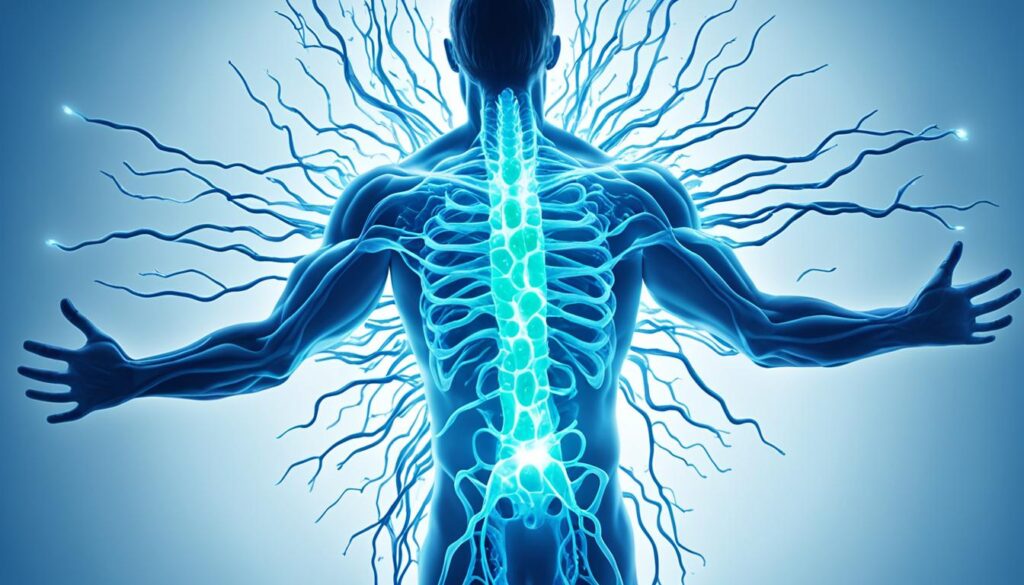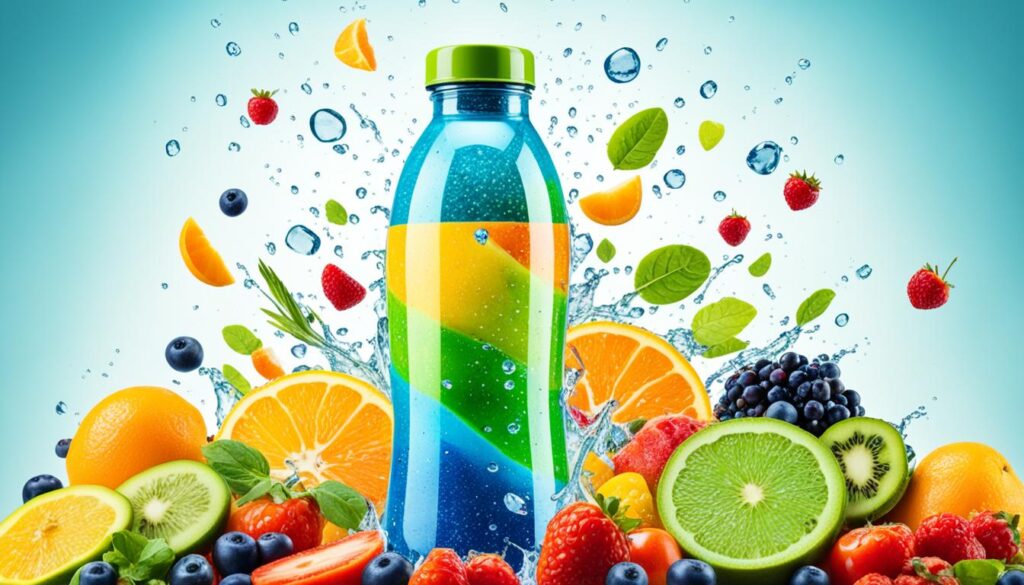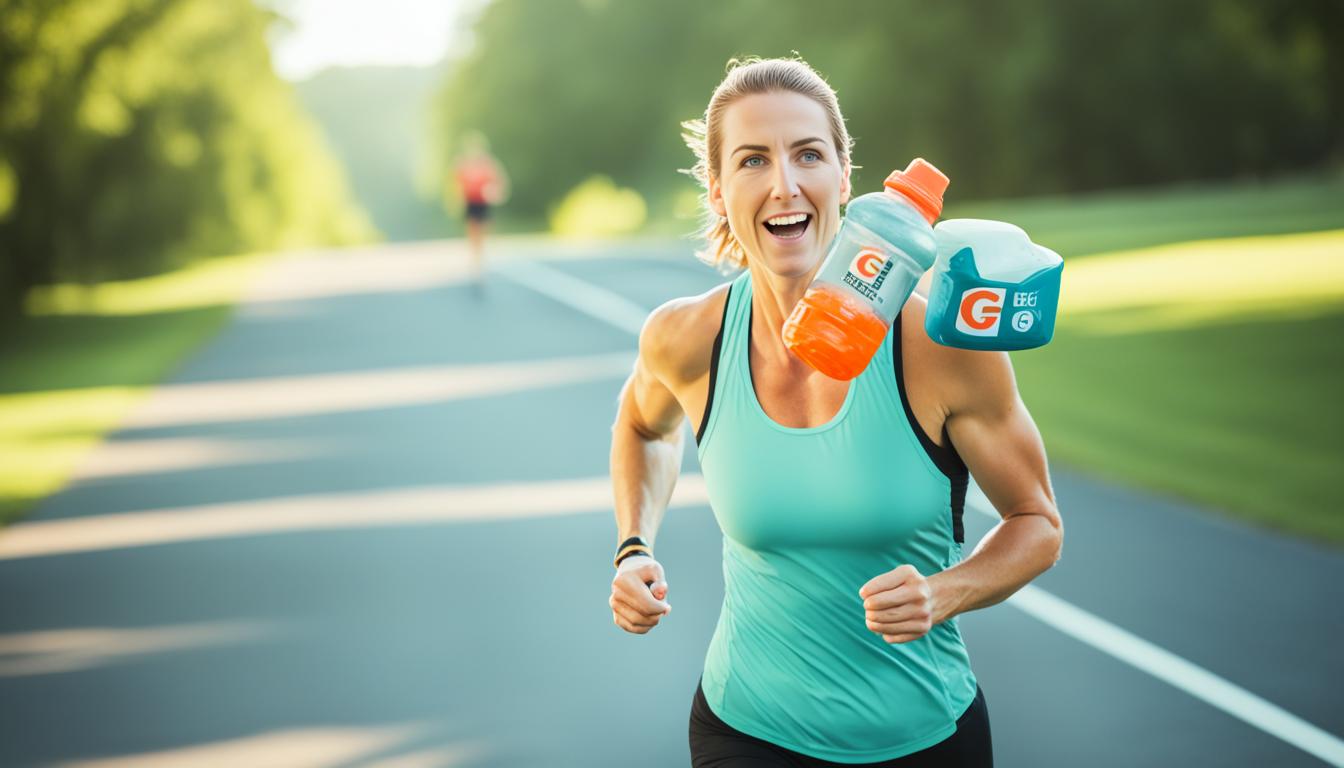“As an Amazon Associate I earn from qualifying purchases.” .
Is a sports drink like Gatorade really the answer to staying hydrated, or is it just a fancy drink? Back in the 1960s, the University of Florida created Gatorade for their athletes. They wanted to help athletes recover from illnesses by replenishing electrolytes, fluids, and carbs. Now, with over $1.6 billion in sales each year, people wonder: Does Gatorade really help you stay hydrated like water does?
Key Takeaways
- Gatorade was first made to replace electrolytes and carbs for athletes at the University of Florida.
- It’s great for athletes and those feeling sick because it helps with electrolyte replacement.
- A 20-ounce bottle of Gatorade Thirst Quencher has 36 grams of sugar.
- Non-athletes, even kids, drinking it often might lead to obesity and other health problems.
- It’s important to know how Gatorade helps with hydration and its effects on health before drinking it.
The Origins and Evolution of Gatorade
Gatorade started as a simple drink to help athletes stay hydrated. Now, it’s a top sports drink known for improving athletic performance. This part will look at how Gatorade began, changed over time, and became a big name in sports.
The Birth of Gatorade
In 1965, Dr. Robert Cade at the University of Florida wanted to help athletes who were getting sick from the heat. He created Gatorade to help them by replacing lost fluids and electrolytes. This drink was a hit with the Florida Gators football team, starting Gatorade’s journey in sports.
Changes in Formulation Over Time
Since its start, Gatorade has changed a lot. It used to be just sugar, salt, and water. Now, it has vitamins, minerals, and artificial stuff for better taste and safety. Today, sports drinks like Gatorade have the right mix of carbs and electrolytes for athletes before, during, and after exercise.
Current Market Position
In 2022, Gatorade is a big name in sports drinks worldwide. It has a huge 67.7% share in the US and its sales have grown a lot, from $100 million in 1983 to over $2.2 billion in 2001. You can find Gatorade in over 80 countries and its formula is backed by research. The company was bought by PepsiCo in 2001, making it a global sports drink leader. For more info on Gatorade’s story and science, check out the full article here.
The Role of Electrolytes in Hydration
Understanding electrolytes is key to knowing how drinks like Gatorade help keep us hydrated during exercise. These minerals are electrically charged and crucial for many body functions. They help manage fluid balance in our bodies.
Understanding Electrolytes
Electrolytes like sodium, potassium, and chloride are vital for nerve and muscle function. They also help keep fluid balance in the body. Losing these minerals through sweat means we need to replenish them, especially during long workouts or in the heat. They help muscles work right and keep the heart beating properly.
The Importance of Sodium and Potassium
Sodium and potassium are key electrolytes in our bodies. They help control fluid balance, nerve signals, and muscle movements. Losing them through sweat can lead to dehydration if not replaced. Keeping the right balance of sodium and potassium is key to avoid muscle cramps and other issues during intense activities.
How Gatorade Helps Replenish Electrolytes
Gatorade is made to help with electrolyte replenishment. It has the right amount of sodium, 35 – 200 mg per eight ounces, and potassium, 15 – 90 mg. This mix is great for athletes and anyone doing long activities. It ensures we stay hydrated better than just drinking water alone.

Ingredients in Gatorade and Their Functions
Gatorade was first made in the 1960s for the University of Florida Gators football team. It has grown to be a big name in sports drinks. The drink mixes different ingredients. Each one plays a key role in helping with exercise recovery and giving a quick energy boost.
Water is a main part of Gatorade, helping with hydration. Sugars and dextrose are added to give a quick energy boost after exercise. Citric acid not only adds flavor but also keeps the drink’s acidity stable.
Sodium and potassium are key electrolytes in Gatorade. Sodium helps keep fluids in the body during hard workouts. Potassium is important for muscle function and keeping electrolytes balanced.
Other ingredients like monopotassium phosphate and sodium citrate help keep the drink’s pH balanced and electrolytes stable. Gum arabic and glycerol ester of rosin make sure the ingredients stay mixed together.
| Ingredient | Function |
|---|---|
| Water | Hydration |
| Sugar | Carbohydrate energy source |
| Dextrose | Rapid energy replenishment |
| Sodium | Fluid retention |
| Potassium | Muscle function and electrolyte balance |
| Citric Acid | Flavor and pH stabilization |
| Sodium Citrate | pH balance |
| Monopotassium Phosphate | Electrolyte stability |
| Gum Arabic | Consistency |
| Glycerol Ester of Rosin | Prevents ingredient separation |
A 20-ounce bottle of Gatorade has about 140 calories. This comes from 34 grams of sugar. These ingredients work together to give athletes and active people the best hydration and energy for recovery.
Does Gatorade Hydrate You?
Gatorade is a popular rehydration drink that helps restore fluid balance after hard work. But what makes it good at hydrating the body?

A 28-ounce bottle of Gatorade G Thirst Quencher has 190 calories, 51 grams of carbs, and 48 grams of sugar. This is more sugar than the daily limits set by the USDA for men and women. It’s made to quickly replace fluids during tough activities. But, it’s important to watch how much sugar you drink, as many people already get too much.
Gatorade also has sodium and potassium to help replace electrolytes. A single bottle gives you over 10% of the sodium you need daily and about 2% of your potassium. These electrolytes are lost when you sweat. But, remember to balance the sodium with other foods.
For athletes, Gatorade can prevent dehydration during hard workouts. It has a high glycemic index of 78, which means it quickly replenishes energy. But, water is just as good for short-term hydration without the sugar and sodium.
A study found that hypotonic sports drinks are best for staying hydrated during long activities. They work better than isotonic or hypertonic drinks. But, how much you need to drink depends on your activity level, age, gender, and the weather. Gatorade is great for fluids and electrolytes during long or hard activities. But, drink it in moderation because of its sugar and sodium. Knowing what you need to stay hydrated is key.
To give you a better idea:
| Element | Gatorade (28 oz) | USDA Recommendation |
|---|---|---|
| Sugar | 48 grams | 36 grams (men), 25 grams (women) |
| Sodium | 10% of daily intake | 2,300 milligrams (ideal below 1,500 mg) |
| Potassium | 2% of daily intake | 3,500 – 4,700 milligrams |
| Calories | 190 | Varies |
In conclusion, Gatorade is a good rehydration drink and helps with fluid replacement. But, be aware of its sugar and sodium levels to drink it in a balanced way.
Comparing Gatorade to Water for Hydration
Choosing between Gatorade and water for hydration is important. Each has its own benefits for staying hydrated and recovering from exercise. The best choice depends on your needs and the situation.
Hydration Efficacy
Staying hydrated is key, especially when you’re active. Both Gatorade and water help rehydrate the body. Water is best for everyday hydration because it’s pure and has no sugars or additives.
Gatorade, on the other hand, has electrolytes and carbs. These can be helpful during long or hard workouts. They help replace what you lose through sweat.
Pros and Cons of Each
- Gatorade:
- Includes electrolytes like sodium and potassium for balance.
- Replaces energy with carbs, great for recovering from exercise.
- But, it has a lot of sugar, which can be bad if you drink too much.
- Water:
- Just water, no calories, sugars, or artificial stuff.
- It’s cheap and easy to get, perfect for staying hydrated all day.
- It doesn’t help replace electrolytes during hard or long activities.
When to Choose Gatorade Over Water
Water is usually enough for everyday hydration and light exercise. But for hard workouts or long sports, Gatorade might be better. It helps replace lost electrolytes and energy, which can improve performance and recovery.
This is backed by studies showing how important hydration is for exercise. The right choice depends on your activity level and needs.
Learn more about sports drinks and their benefits here.
| Factor | Gatorade | Water |
|---|---|---|
| Key Benefit | Electrolyte and carbohydrate replenishment | Pure hydration |
| Ideal Use | Intense athletic activities or prolonged exercise | Daily hydration and low-intensity activities |
| Sugar Content | High | None |
| Calories | Moderate to high | Zero |
So, Gatorade and water both have their place in hydration. Knowing when to use each can help you stay at your best and healthy.
Impact of Gatorade on Athletic Performance
Hydration is key for athletes to stay at their best. Losing just 2% of body weight to sweat can really slow them down. Gatorade helps by mixing electrolytes and carbs. These help athletes stay hydrated and full of energy during tough workouts.
Football players in the heat and humidity need to watch out for dehydration. Gatorade can help prevent muscle cramps and keep them hydrated during long workouts. Running long distances can make athletes lose up to 3 quarts of fluid an hour, showing how important staying hydrated is.
Electrolytes like potassium and magnesium are vital for muscles and nerves. Studies show isotonic sports drinks keep muscles and organs working well. This is key for athletes wanting to do their best.
| Fluid Type | Carbohydrate Level | Electrolyte Level | Best For |
|---|---|---|---|
| Isotonic Sports Drinks | 6% – 8% | Similar to human blood | Sustained exercise and hydration |
| Hypotonic Sports Drinks | Lower than body fluids | Lower than body fluids | Quick hydration, lesser energy replacement |
| Hypertonic Sports Drinks | Higher than body fluids | Higher than body fluids | Post-exercise recovery |
Athletes should drink 24 ounces of sports drinks like Gatorade two hours before exercise. This helps with hydration and keeping electrolytes balanced. It’s important for avoiding dehydration and keeping up performance.
Using a sports drink like Gatorade before, during, and after exercise has many benefits. It keeps athletes hydrated, prevents muscle cramps, and gives energy from carbs. This supports their goal of improving athletic performance.
Potential Downsides of Drinking Gatorade
Gatorade is known for helping with hydration and electrolyte replenishment. But, it’s key to look at the downsides, especially when thinking about healthy eating and losing weight.
Sugar Content and Health Implications
A 12-ounce serving of Gatorade Thirst Quencher packs 48g of sugars and 190 calories. Gatorade Endurance has 26g of sugars and 180 calories. This high sugar can increase calorie intake, which is bad for weight loss goals.
Studies link sugar-sweetened drinks to obesity and a higher diabetes risk. Even G2, with 16g of sugars, has health concerns.
Artificial Ingredients and Their Effects
Gatorade has synthetic citric acid, which can upset stomachs. Artificial dyes like Yellow #6, Blue #1, Red #40, and Yellow #5 are also in it. These have been linked to hyperactivity and may even be cancer-causing.
This highlights the need for smart choices for those focusing on healthy eating.
Considerations for Non-Athletes
For those who aren’t athletes, Gatorade’s 380mg of sodium per serving can be too much. Non-athletes don’t need this much electrolyte replenishment. This extra sodium can make losing weight harder and increase health risks.
Alternatives to Gatorade for Hydration
Gatorade is a top pick for staying hydrated and getting electrolytes, but there are natural options too. These alternatives have less sugar but still help with hydration.
Plain Water and Infused Water
Plain water is the simplest and most effective way to stay hydrated. For extra flavor, try infused water with fruits like lemon, lime, or cucumber.
This option not only hydrates you but also gives you vitamins and minerals from the fruits.
Coconut Water
Coconut water is a great choice for its hydration and electrolyte benefits. It has about 45 calories per cup, with 6g of sugar. It also has important nutrients like magnesium, phosphorus, potassium, and sodium, but less sugar than Gatorade.
It’s perfect for those who want to stay hydrated without too much sugar.
Electrolyte Tablets and Pedialyte
For a precise way to add electrolytes, consider electrolyte tablets and Pedialyte. They offer essential electrolytes like sodium and potassium without the sugar found in sports drinks.
- Electrolyte Tablets: These tablets dissolve in water to make a drink that’s low in calories and sugar, great for staying hydrated during hard workouts.
- Pedialyte: Originally for kids, Pedialyte is now used by adults too. It has a good balance of electrolytes and less sugar.
Choosing natural ways to stay hydrated and replenish electrolytes is important for a healthy life. It’s especially good for people with health issues or who don’t do much exercise.
Expert Opinions on the Use of Gatorade
There is a debate among sports nutrition experts on using Gatorade for hydration. Gatorade is great for intense, long activities where athletes lose a lot of fluids and electrolytes.
Experts say Gatorade should be part of a complete hydration plan. For example, in marathon running, it helps prevent hyponatremia by replacing lost sodium. Drinking too much water can lead to this condition.
“Small amounts of sports drinks like Gatorade can be appropriate for young people participating in vigorous physical activity in hot, humid weather,” according to the Committee on Nutrition and the Council on Sports Medicine and Fitness. However, they also caution about the high sugar content in these drinks, urging careful consumption for maintaining a balanced diet, especially in children.
A study on distance kayakers showed that Gatorade helped them stay hydrated better than water. The group using Gatorade lost less water after an hour of paddling. Experts say Gatorade’s carbs also give energy for long activities.
But, there are worries about the sugar in Gatorade. A 20 fl oz bottle has 34 grams of sugar, which can lead to obesity, especially in kids. Drinking too many sugary drinks daily can increase the risk of high blood pressure and hypertension.
Experts recommend using Gatorade wisely, balancing it with a healthy diet. It’s good for athletes who sweat a lot. But, others should be careful not to consume too much sugar.
Using Gatorade should be done with knowledge and evidence. It’s part of a good plan for staying hydrated and healthy.
Conclusion
Gatorade is a great choice for athletes and active people who need to stay hydrated during tough workouts. It has electrolytes like sodium and potassium that help replace lost nutrients. This makes it a good option for improving endurance and performance.
But, it’s important to make smart choices about when to drink Gatorade. A 12-oz bottle has 21 grams of sugar, which can add a lot to your daily sugar intake. The American Heart Association says to limit added sugars. Drinking Gatorade too often can also lead to weight gain in teens.
So, while Gatorade is good for certain situations, water is usually the best choice for most people, especially kids and those who aren’t athletes. Choosing natural hydration sources or diluted sports drinks is better for staying hydrated without too much sugar. Making smart choices helps keep you healthy and performing well.
FAQ
Does Gatorade help with dehydration prevention?
What are the origins of Gatorade?
How has Gatorade’s formulation changed over time?
What is Gatorade’s current market position?
Why are electrolytes important for hydration?
How does Gatorade help replenish electrolytes?
What ingredients are in Gatorade and what are their functions?
Does Gatorade hydrate you better than water?
What are the pros and cons of Gatorade compared to water?
How does Gatorade impact athletic performance?
What are the potential downsides of drinking Gatorade?
What are some alternatives to Gatorade for hydration?
What do experts say about the use of Gatorade?
“As an Amazon Associate I earn from qualifying purchases.” .



